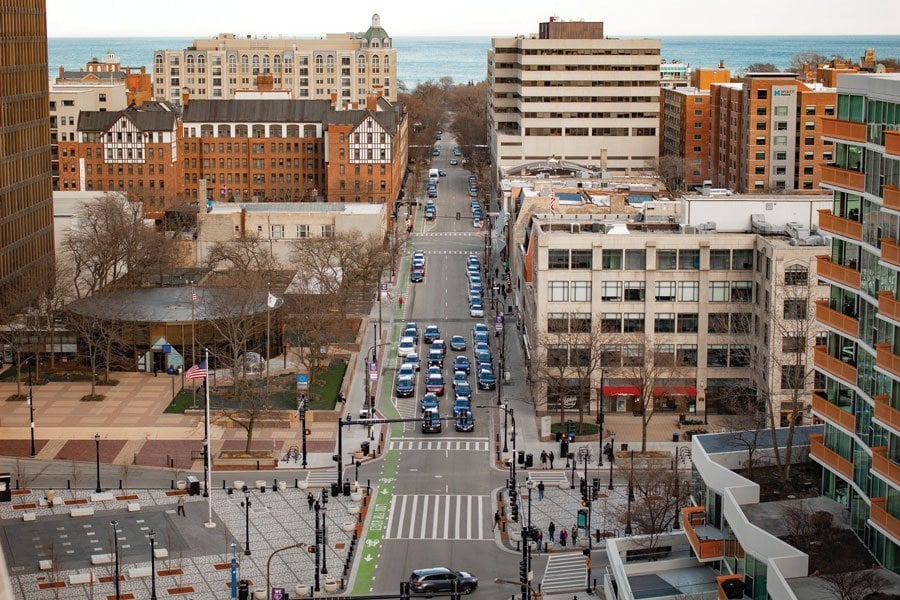Evanston businesses take out Paycheck Protection Program loans
Daily file photo by Evan Robinson-Johnson
Downtown Evanston. During COVID-19, retailers have had to pivot their business methods to serve customers and stay afloat.
August 6, 2020
Two hundred Evanston businesses have taken out Paycheck Protection Program loans of over $150,000 to help them continue to pay their workers, including schools, nonprofits and restaurants, according to the U.S. Department of the Treasury and the Small Business Administration.
PPP loans are designed to provide a direct incentive for small businesses to keep their workers on the payroll, and its amount is calculated based on two-and-a-half months’ worth of salary for the employees.
“With this COVID(-19), we have two major problems ― there is a large subset of the population whose income is literally turned off,” Economics Prof. Lawrence Christiano said. “Another major problem has to do with the businesses that hire them. They have no revenues, but they still have expenses.”
Roycemore School, a pre-K through 12th grade independent private school located in Evanston, is among the businesses that received a PPP loan. It received between $350,000 and $1 million.
Vicky Pickett, the director of finance and operations of the school, said the pandemic hit at a time the school was actively recruiting for the next academic year, a primary source of revenue. That recruiting process involves visiting campus and meeting faculty and staff.
“The revenue stream that we have typically during that time of year sort of dried up,” Pickett said. “We needed that cash flow to help us get through the rest of the academic year.”
Pickett added that Roycemore School used the PPP funds toward paying staff and faculty while continuing to provide academic programs to the students while school buildings were closed. Roycemore School has already reopened to some children for its in-person summer camp.
The PPP loans also allowed the school to look more clearly and plan ahead for the future, as it is planning to open school the last week of August for all of its students, Pickett said.
The Evanston Community Foundation, a local philanthropy that supports nonprofits, also received a PPP loan of under $200,000. Jan Fischer, ECF’s chief financial officer, said as a result of the pandemic, many organizations in the nonprofit sector have experienced a substantially increased demand for their support and services, so PPP loans are important in that they allow them to maintain staff to deliver those services.
“ECF has been very active and trying to respond to the adverse effects of the COVID(-19) pandemic on our most vulnerable community members, and we do that by providing support to our local nonprofits,” Fischer said. “There’s a lot of labor-intensive time spent building collaboration, exchanging information, participating in task forces, and so we need the manpower.”
Fischer added that in addition to increased demand for support and services from ECF, there is uncertainty around the organization’s revenue streams for this year, so the PPP loan provided timely resources to support their staff when their work was most needed.
PPP loans are not only important in that they allow businesses to continue paying their employees, but they’re also important because in the U.S., health care is attached to your job, Christiano said.
“When you lose your job, then you’re in trouble,” Christiano said. “And so the thing about the Paycheck Protection Plan is to get money to these people in a way that they can stay stuck to their jobs and so their health care doesn’t get turned off.”
In June, Evanston business owner Rahul Shah was charged with trying to falsely claim over $440,000 in PPP loans. The government alleges that he falsified his application for the loan, and Shah was charged with bank fraud and making false statements to a financial institution. These crimes are each punishable by up to 30 years in federal prison.
Shah is the founder and CEO of Katalyst Technologies, Inc., and Boardshare LLC, both of which have offices at 500 Davis St.
“There are a lot of downsides with this massive intervention; one of them is that there are going to be some bad actors,” Christiano said. “There are some other economic downsides, like inefficiencies and stuff like that, but at a time of major national crisis like this, we have to be willing to pay the price of those problems.”
Christiano added that although the government can’t monitor all the loans to completely protect against all these “bad actors,” implementing programs that have inefficient side effects, like the PPP, is the right thing to do.
Email: vivianxia2023@u.northwestern.edu
Twitter: @vivianxia7



